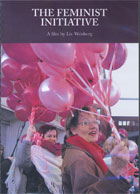
The Feminist Initiative 2009
Distributed by Women Make Movies, 462 Broadway, New York, NY 10013; 212-925-0606
Produced by Gravity Films
Directed by Liv Weisberg
DVD, color, 97 min.
Jr. High - Adult
Women's Studies, Gender Studies, Political Science, Media Studies, Gay & Lesbian Studies
Date Entered: 07/31/2009
Reviewed by Justin Cronise, University at Buffalo, State University of New YorkThe Feminist Initiative follows the founding of the feminist political party of the same name in Sweden in 2005 – the first feminist political party in the world. The Feminist Initiative (known as F!) was formed as a highly democratic coalition that didn’t follow the traditional “patriarchal pyramid” of top-down governance. The key issues and the political platform of F! came from its members, and three party leaders were elected instead of one.
The film documents the bumpy road to the parliamentary elections, as conflict and discord comes from both without and within the party. From the outset, differing visions for the direction of the party lead to compromises and frustration. For one key member, a women’s rights activist from the 1970s, the move to becoming a political party instead of an intellectually motivated activist group is too much and she leaves the group – but enters the media spotlight. In a number of highly publicized interviews, she bashes the group as well as certain individual board members, which leads to a prolonged media “witch hunt” of one of the F! board members involving death threats and allegations of fraud. More bad press stems from a scandal by a different feminist organization in which a spokeswoman stated on television that “All men are animals,” and F! is incorrectly associated and bears the brunt of an extended public backlash.
The Feminist Initiative is an illuminating glimpse into the modern women’s rights movement as well as its connection to the LGBT rights movement (lesbian, gay, bisexual, and transgender – a connection which is ultimately not embraced by F!), but also offers a critical look at politics in general, the struggle of new political parties, and the ruthless power of the news media to distort the issues and ignore that which is actually important. In addition, the film may be a study of women as leaders, women wielding power, and women fighting for power.
Although Sweden is considered one of the most gender-equal countries in the world, it is still a struggle for women’s voices to be heard as they fight for pay equality and greater protection from rape and violence. The struggles evidenced in The Feminist Initiative will raise awareness of gender inequality, and reveal differences in governance between the traditional male-dominated “patriarchies” that people around the world have grown up with compared to a gender-equal governance that is the model for F!. The Feminist Initiative also raises questions about the meaning of “feminism” and “equality” in modern society.
The film flows generally smoothly, but the time period is long enough that sometimes it seems to jump ahead too quickly to condense the film into a manageable duration. The dialogue is generally all in Swedish so there are subtitles in English, which are adequate most of the time but seem to miss parts when more than one person is speaking at once during meetings and debates.
Well-done overall, The Feminist Initiative is always intriguing – and at times moving – and is recommended especially for academic libraries supporting women’s studies and political science.